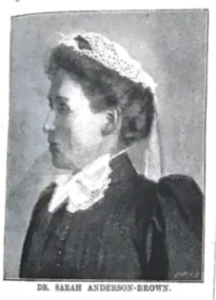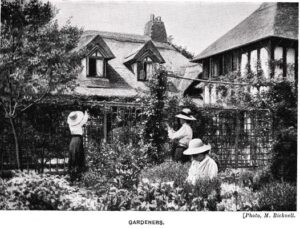National Growing for Wellbeing Week 7th – 13th June 2021, ‘is a celebration of the magic that growing your own produce can do for your wellbeing, both physically and mentally.’
You might imagine that ‘Growing for Wellbeing’ is a modern concept; that horticultural pursuits such as gardening, as an aid to our mental wellbeing in particular, has only been recognised in recent years but this is not necessarily so. Duxhurst Inebriate Farm Colony was set up back in the 1890’s and outdoor activities were a major part of the treatment regime for the women who went there; women of all classes, who entered due to their struggle with alcohol and drug misuse.
If we are lucky enough to have our own gardens or any small space, even a windowsill, many of us have been able to experience the pleasure of gardening during the Covid Pandemic. We may have had a bit more time recently particularly during the lockdowns, to enjoy the sense of achievement and satisfaction that gardening can bring. From simply planting a seed and watching it grow, to creating a full on vegetable plot; the benefits for body and mind can’t be underestimated.
‘The Nature Cure for Inebriates’
 Duxhurst Inebriate Farm Colony, near Reigate in Surrey was founded by Lady Henry Somerset in 1896. She was President of the British Womens Temperance Association (BWTA) from 1890-1903. Duxhurst took the idea that fresh air was medicine for the body and soul, and gardening along with other outdoor activities were an integral part of the day to day life for the women who were admitted.
Duxhurst Inebriate Farm Colony, near Reigate in Surrey was founded by Lady Henry Somerset in 1896. She was President of the British Womens Temperance Association (BWTA) from 1890-1903. Duxhurst took the idea that fresh air was medicine for the body and soul, and gardening along with other outdoor activities were an integral part of the day to day life for the women who were admitted.
In contrast to the reformatories of the day, the women who came here were not called ‘inmates’ or ‘prisoners’ but patients who came to be treated with kindness and compassion and not punishment. Duxhurst was an excellent example of the ‘Growing for Wellbeing’ principle. The founders of the Farm Colony recognised the health benefits this would bring to women who were at a very low point in their lives and needed to re-build their physical and mental wellbeing.
Dr. Sarah Anderson-Brown
 The concept for the Farm Colony was proposed to Lady Henry by Dr. Sarah Anderson-Brown. She had a keen interest in gardening as far back as her teenage years in the USA, and recognised that this could be a method for the ‘cure of inebriety’.
The concept for the Farm Colony was proposed to Lady Henry by Dr. Sarah Anderson-Brown. She had a keen interest in gardening as far back as her teenage years in the USA, and recognised that this could be a method for the ‘cure of inebriety’.
An interview with Dr. Anderson-Brown in the Woman’s Signal of May 1894, discusses ‘The Nature Cure For Inebriates’ as a possible ‘cure of the drunkard.’ She qualified as a medical Doctor in New York as a young woman, before going on to China as a Missionary. Taking seeds with her on her travels, she was able to have a fresh supply of vegetables within a few months. Lady Henry met her after she had left her missionary work in China due to illness. A meeting was set up by Lady Henry in 1893, which was attended by Dr. Anderson-Brown and the plan for the farm colony and treatment concept was muted, becoming an affiliated interest of the BWTA.
A location was found for the village style settlement and was described as a ‘breezy upland farm overlooking the beautiful plains that stretch away to the hills of Surrey, the strong bracing air, and the lovely woods….’ What a change of scenery it must have been, especially by those women coming from the misery and slums of the inner cities.
Where previous methods of employment for women in reformatory institutions had largely consisted of washing and sewing, Dr. Anderson-Brown recognised that laundry work was exhaustive and that it could keep up the ‘crave because of the drain it makes on the nervous and muscular system.’ Everyday laundry was a laborious and time consuming task for the average woman. I really don’t think we have any complaints today with our washing machines and dryers!
Although laundry was a necessary part of every day life at the farm colony , the concept she proposed provided a completely different focus – ‘plenty of outdoor work, indoor occupation where that is prevented, plenty of fruit and vegetables in the diet, rational amusements, rural surroundings, cheerful society, and an atmosphere of constant Christly love.’
In Beauty for Ashes about Duxhurst, Lady Henry wrote, ‘Fresh air is life to everybody….it is the great re-builder of health.’
‘Fresh Air….set right the disordered nerves, and prove a tonic to the sluggish brain’
Having been admitted to Duxhurst through various routes (some arriving in order to avoid a prison sentence), the patients became involved in a range of occupations, many being outside adhering to the philosophy of Duxhurst that fresh air was good for everyone. Gardening included growing tomatoes, grapes, cucumbers, mushrooms and flowers for market. Other outdoor activities included bee-keeping, basket weaving and hay-making.
Women who had been country-bred and spent time planting, pruning and fruit gathering could be reminded of happier childhood days in the country. Other women became experts in the care of poultry and dairy work, with produce being used at the Colony or sold. By being involved in completely new occupations, the women gained a fresh outlook to their daily work and it had the ‘desired effect of breaking all continuity of thought with the past.’
Miss Jessie Smith – Lady Gardener
In line with Lady Henry’s interest in women’s rights, a lady gardener called Miss Jessie Smith was employed to oversee this occupation. Miss Smith had studied at Swanley Horticultural College in Kent as one of the original women students. The gardens at Kew had led the way by engaging two of the first women students from Swanley.
In the BWTA Annual Report of 1896, Lady Henry noted that women had come into their own in this occupation, and I read with a smile, that Miss Smith had been able to ‘introduce among the patients a spirit of emulation in the gardening work that could never have been brought about if we had had the services of a “mere man”’!!
Glass-houses, Seed Markets and Rebels
The work was diverse with the patients ‘able to master the mysteries of greenhouse cultivation’. They sowed acres in sweet peas and sunflowers for the seed market, whilst growing Chrysanthemums in glass houses to sell. What a sense of satisfaction must have been achieved.
It does paint a seemingly idyllic picture but the reality was that at first some of the patients did rebel against garden and field work. However, Lady Henry stated that ‘after a little while they all came to care for it so much that it is difficult to get them to come in from it, even to their dinners so long as there is something to do for a tender crop.’
There must have been the inevitable difficult cases to manage, but enthusiasm was awakened in the women who engaged in these activities and an extract from The Woman’s Signal of Jan 1897, records that the women ‘were as intent on sending their crop of early vegetables to the London market as any other professional market gardener in the land, and as proud of their handiwork.’ And rightly so….
Flowers blooming
Some women were eventually able to return home, whilst others were helped to find suitable positions or received financial help from the Salvation Army to move abroad. Lady Henry became regarded as an expert in this field of care. One ex patient who stayed at Duxhurst along with her children wrote –
‘Dear Madam – I thought you would like to know that I am still going on all right, and I am very happy at home with my husband and children. I assure you I feel a new women altogether. I shall never forget my twelve months stay at Duxhurst, nor the many kindnesses shown to me and my children; and I do hope that all who leave Duxhurst will feel the same as I do. The children are always talking of the place and the happy time they spent there. I do sincerely try my best for them all to make up for the past.’ (The Woman’s Signal 2 Feb 1899)
I think that Lady Henry sums up the outdoor life at Duxhurst, where some of the women had ‘never seen a blade of grass grow’, when she wrote –
‘Contact with Mother Earth brings a rest all of its own, and I have seen the return of health to many a woman, wan and jaded, who has worked among the flowers and plants.’ (From Beauty for Ashes by Lady Henry Somerset)
See website – National Growing for Wellbeing Week 2021
#GYOforWellbeing
For more information about the history of the British Women’s Temperance Association please CLICK HERE or for more information about the services that we provide today CLICK HERE




